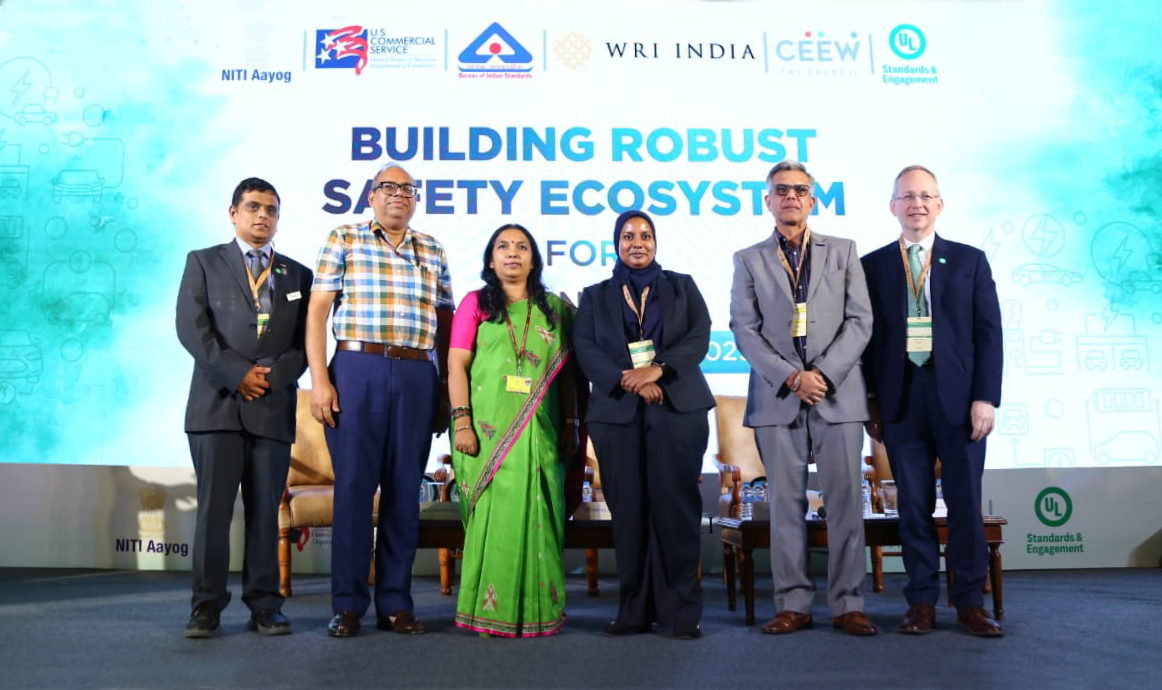-
News
August 23, 2023
New Delhi Conference and Roundtable on Standards for Safe, Secure, Sustainable Indian Electric Vehicles

On August 22-23, 2023, UL Standards & Engagement and the U.S. Commercial Service convened expert stakeholders for a conference and roundtable discussion in New Delhi to address the rise in electric vehicle fires in India and discuss standards for mitigating the risks of fire and explosion from EV batteries and charging systems.
Expert speakers included Union Minister of MoRTH Nitin Gadkari, United States Ambassador to India Eric Garcetti, ULSE Executive Director Dr. David Steel, Vice President and Executive Director of the Electrochemical Safety Research Institute of UL Research Institutes Dr. Judy Jeevarajan, ULSE Vice President of International Standards Sonya Bird, ULSE Regional Standards Manager Manjunath V., and Principal Designated Engineer (PDE) Manager for Energy and Industrial Automation at UL Solutions Joe Bablo.
Over the course of the two-day event, the designated representatives shared their individual and career-related encounters with the attendees. This was aimed at enlightening them about the significance of EV standards and safety protocols.
On the first day, Bird opened the roundtable with a welcome address, thanking partner organizations NITI Aayog, the Bureau of Indian Standards, WRI India, and the Council on Energy, Environment and Water for their collaboration in organizing the event, and outlining the goals for collaboration.
“The growing fires are the result of a growing market of EV and e-mobility devices,” Bird said. “While lithium-ion batteries are the main sources of these fires, the entire EV value chain – from battery management systems, to components like sockets, connectors, charging infrastructure, and even end-of-life management of batteries – requires careful evaluation and standardization to help ensure safe operation.”
Steel opened the conference on the second day by reiterating the goals for the conference and emphasizing the importance of partnerships and long-term strategies in helping to guide new and evolving technologies like electric vehicles.
“The road to the safe adoption of electric vehicles in India—and globally—will require immense collaboration and we are proud to support advancing the conversation toward a safer, more secure, and sustainable future, Steel said.”
Outcomes of the event
The event was designed to build upon the extensive work of the Government of India by initiating a series of sustainability initiatives in support of its Long-Term Low Emission Development Strategy to help achieve a national goal of net zero emissions by 2070. It was also intended to help advance some of the outcomes of the 5th Ministerial level meeting of the India-U.S. Commercial Dialogue. Among these outcomes is the development of a common standards and conformity assessment framework for renewable energy and clean technology, and the development and adoption of standards for energy storage and transportation.
The plan, as outlined by Steel in his address, will feature a three-year approach, beginning with a focus on batteries, EV components, charging infrastructure, two-wheelers, three-wheelers, and cars in the first year. The second year will include a focus on standards for large trucks, buses, and heavy-duty vehicles, and the third year will include a focus on addressing hydrogen fuel cell safety.
At the conference, ULSE shared its “EV Battery Safety Guideline for India” with stakeholders in attendance, inviting them to review the document and provide input.
“Addressing safety in the entire EV value chain – from manufacturing to consumer use and safe disposal – is essential,” Bird said in the foreword of the document. “We look forward to what we will accomplish together as we dedicate our efforts toward the development of a safer EV ecosystem in India.”
“The potential of EVs is inextricably linked to safety. We can protect and progress. That’s the role UL Standards & Engagement plays — and one where we will continue to look to all of you for support,” Steel said in concluding the event.